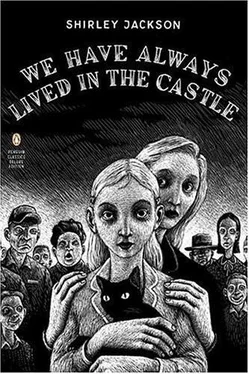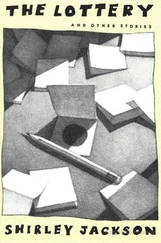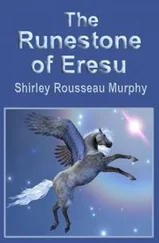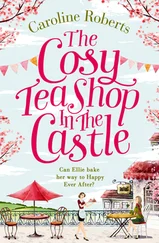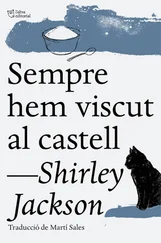Shirley Jackson - We Have Always Lived in the Castle
Здесь есть возможность читать онлайн «Shirley Jackson - We Have Always Lived in the Castle» весь текст электронной книги совершенно бесплатно (целиком полную версию без сокращений). В некоторых случаях можно слушать аудио, скачать через торрент в формате fb2 и присутствует краткое содержание. Город: New York, Год выпуска: 2006, ISBN: 2006, Издательство: Penguin Books, Жанр: Триллер, gothic_novel, на английском языке. Описание произведения, (предисловие) а так же отзывы посетителей доступны на портале библиотеки ЛибКат.
- Название:We Have Always Lived in the Castle
- Автор:
- Издательство:Penguin Books
- Жанр:
- Год:2006
- Город:New York
- ISBN:978-1-101-53065-8
- Рейтинг книги:3 / 5. Голосов: 1
-
Избранное:Добавить в избранное
- Отзывы:
-
Ваша оценка:
- 60
- 1
- 2
- 3
- 4
- 5
We Have Always Lived in the Castle: краткое содержание, описание и аннотация
Предлагаем к чтению аннотацию, описание, краткое содержание или предисловие (зависит от того, что написал сам автор книги «We Have Always Lived in the Castle»). Если вы не нашли необходимую информацию о книге — напишите в комментариях, мы постараемся отыскать её.
is a deliciously unsettling novel about a perverse, isolated, and possibly murderous family and the struggle that ensues when a cousin arrives at their estate.
We Have Always Lived in the Castle — читать онлайн бесплатно полную книгу (весь текст) целиком
Ниже представлен текст книги, разбитый по страницам. Система сохранения места последней прочитанной страницы, позволяет с удобством читать онлайн бесплатно книгу «We Have Always Lived in the Castle», без необходимости каждый раз заново искать на чём Вы остановились. Поставьте закладку, и сможете в любой момент перейти на страницу, на которой закончили чтение.
Интервал:
Закладка:
Constance turned and looked at me for a minute, frowning a little. “You will not ask them,” she said at last. “We do not ask from anyone. Remember that.”
“I was teasing,” I said, and she smiled again. “I really only want a winged horse, anyway. We could fly you to the moon and back, my horse and I.”
“I remember when you used to want a griffin,” she said. “Now, Miss Idleness, run out and set the table.”
“They quarrelled hatefully that last night,” Uncle Julian said. “I won’t have it,’ she said, ‘I won’t stand for it, John Blackwood,’ and ‘We have no choice,’ he said. I listened at the door, of course, but I came too late to hear what they quarrelled about; I suppose it was money.”
“They didn’t often quarrel,” Constance said.
“They were almost invariably civil to one another, Niece, if that is what you mean by not quarrelling; a most unsatisfactory example for the rest of us. My wife and I preferred to shout.”
“It hardly seems like six years, sometimes,” Constance said. I took the yellow tablecloth and went outside to the lawn to start the table; behind me I heard her saying to Uncle Julian, “Sometimes I feel I would give anything to have them all back again.”
When I was a child I used to believe that someday I would grow up and be tall enough to touch the tops of the windows in our mother’s drawing room. They were summer windows, because the house was really intended to be only a summer house and our father had only put in a heating system because there was no other house for our family to move to in the winters; by rights we should have had the Rochester house in the village, but that was long lost to us. The windows in the drawing room of our house reached from the floor to the ceiling, and I could never touch the top; our mother used to tell visitors that the light blue silk drapes on the windows had been made up fourteen feet long. There were two tall windows in the drawing room and two tall windows in the dining room across the hall, and from the outside they looked narrow and thin and gave the house a gaunt high look. Inside, however, the drawing room was lovely. Our mother had brought golden-legged chairs from the Rochester house, and her harp was here, and the room shone in reflections from mirrors and sparkling glass. Constance and I only used the room when Helen Clarke came for tea, but we kept it perfectly. Constance stood on a stepladder to wash the tops of the windows, and we dusted the Dresden figurines on the mantel, and with a cloth on the end of a broom I went around the wedding-cake trim at the tops of the walls, staring up into the white fruit and leaves, brushing away at cupids and ribbon knots, dizzy always from looking up and walking backward, and laughing at Constance when she caught me. We polished the floors and mended tiny tears in the rose brocade on the sofas and chairs. There was a golden valance over each high window, and golden scrollwork around the fireplace, and our mother’s portrait hung in the drawing room; “I cannot bear to see my lovely room untidy,” our mother used to say, and so Constance and I had never been allowed in here, but now we kept it shining and silky.
Our mother had always served tea to her friends from a low table at one side of the fireplace, so that was where Constance always set her table. She sat on the rose sofa with our mother’s portrait looking down on her, and I sat in my small chair in the corner and watched. I was allowed to carry cups and saucers and pass sandwiches and cakes, but not to pour tea. I disliked eating anything while people were looking at me, so I had my tea afterwards, in the kitchen. That day, which was the last time Helen Clarke ever came for tea, Constance had set the table as usual, with the lovely thin rose-colored cups our mother had always used, and two silver dishes, one with small sandwiches and one with the very special rum cakes; two rum cakes were waiting for me in the kitchen, in case Helen Clarke ate all of these. Constance sat quietly on the sofa; she never fidgeted, and her hands were neatly in her lap. I waited by the window, watching for Helen Clarke, who was always precisely on time. “Are you frightened?” I asked Constance once, and she said, “No, not at all.” Without turning I could hear from her voice that she was quiet.
I saw the car turn into the driveway and then saw that there were two people in it instead of one; “Constance,” I said, “she’s brought someone else.”
Constance was still for a minute, and then she said quite firmly, “I think it will be all right.”
I turned to look at her, and she was quiet. “I’ll send them away,” I said. “She knows better than this.”
“No,” Constance said. “I really think it will be all right. You watch me.”
“But I won’t have you frightened.”
“Sooner or later,” she said, “sooner or later I will have to take a first step.”
I was chilled. “I want to send them away.”
“No,” Constance said. “Absolutely not.”
The car stopped in front of the house, and I went into the hall to open the front door, which I had unlocked earlier because it was not courteous to unlock the door in a guest’s face. When I came onto the porch I saw that it was not quite as bad as I had expected; it was not a stranger Helen Clarke had with her, but little Mrs. Wright, who had come once before and been more frightened than anyone else. She would not be too much for Constance, but Helen Clarke ought not to have brought her without telling me.
“Good afternoon, Mary Katherine,” Helen Clarke said, coming around the car and to the steps, “isn’t this a lovely spring day? How is dear Constance? I brought Lucille.” She was going to handle it brazenly, as though people brought almost strangers every day to see Constance, and I disliked having to smile at her. “You remember Lucille Wright?” she asked me, and poor little Mrs. Wright said in a small voice that she had so wanted to come again. I held the front door open and they came into the hall. They had not worn coats because it was such a fine day, but Helen Clarke had the common sense to delay a minute anyway; “Tell dear Constance we’ve come,” she said to me, and I knew she was giving me time to tell Constance who was here, so I slipped into the drawing room, where Constance sat quietly, and said, “It’s Mrs. Wright, the frightened one.”
Constance smiled. “Kind of a weak first step,” she said. “It’s going to be fine, Merricat.”
In the hall Helen Clarke was showing off the staircase to Mrs. Wright, telling the familiar story about the carving and the wood brought from Italy; when I came out of the drawing room she glanced at me and then said, “This staircase is one of the wonders of the county, Mary Katherine. Shame to keep it hidden from the world. Lucille?” They moved into the drawing room.
Constance was perfectly composed. She rose and smiled and said she was glad to see them. Because Helen Clarke was ungraceful by nature, she managed to make the simple act of moving into a room and sitting down a complex ballet for three people; before Constance had quite finished speaking Helen Clarke jostled Mrs. Wright and sent Mrs. Wright sideways like a careening croquet ball off into the far corner of the room where she sat abruptly and clearly without intention upon a small and uncomfortable chair. Helen Clarke made for the sofa where Constance sat, nearly upsetting the tea table, and although there were enough chairs in the room and another sofa, she sat finally uncomfortably close to Constance, who detested having anyone near her but me. “Now,” Helen Clarke said, spreading, “it’s good to see you again.”
“So kind of you to have us,” Mrs. Wright said, leaning forward. “Such a lovely staircase.”
Читать дальшеИнтервал:
Закладка:
Похожие книги на «We Have Always Lived in the Castle»
Представляем Вашему вниманию похожие книги на «We Have Always Lived in the Castle» списком для выбора. Мы отобрали схожую по названию и смыслу литературу в надежде предоставить читателям больше вариантов отыскать новые, интересные, ещё непрочитанные произведения.
Обсуждение, отзывы о книге «We Have Always Lived in the Castle» и просто собственные мнения читателей. Оставьте ваши комментарии, напишите, что Вы думаете о произведении, его смысле или главных героях. Укажите что конкретно понравилось, а что нет, и почему Вы так считаете.
